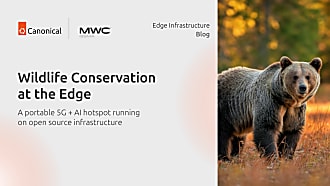Katie Elston
on 19 December 2019

Canonical and Dell EMC have announced the release of a new OpenStack reference architecture – providing customers with a tested, certified framework for deploying Canonical’s Charmed OpenStack solution on top of Dell EMC’s best-of-breed PowerEdge servers. This follows the availability of a Kubernetes reference architecture solution made available in 2018.
Enterprises looking to modernise their IT infrastructure are all too often held back by the time it takes to configure and test new technology in their environments. Overcoming this challenge demands ready-made solutions that can minimise the cost and complexity of implementation.
EMC hardware is the preferred platform for OpenStack deployments, powering 33% of users’ clouds. While on the software side, Canonical is a leader in delivering cloud infrastructure, and more than 50% of production OpenStack deployments run on Ubuntu. The new reference architecture will help enterprises enjoy the best of both worlds, offering proven guidance on how to rapidly deploy the leading OpenStack solution on the leading hardware.
With the benefits of predictable costs and open standards, OpenStack has established itself as a highly popular alternative to traditional virtualisation technologies – and this newly published reference architecture makes it easier than ever to migrate from VMWare to Canonical OpenStack on Dell EMC servers. Similarly, OpenStack is increasingly replacing inflexible, proprietary network function virtualisation (NFVi) solutions, and Ubuntu-based OpenStack already powers the majority of Tier 1 telcos.
This announcement follows on directly from the Kubernetes reference architecture published by Canonical and Dell last year. Much like the new OpenStack document, the Kubernetes reference architecture is a tested and validated deployment guide that helps customers quickly and reliably implement Canonical’s Charmed Kubernetes on Dell EMC infrastructure. This production-ready container solution empowers enterprises with a self-service platform to create, modify, and deploy applications on-demand, enabling faster deployment and release lifecycles.
Taken together, Canonical’s Charmed OpenStack and Charmed Kubernetes reference architectures provide a roadmap for implementing a complete, open source, private cloud stack that works right out of the box. Kubernetes runs on OpenStack, and then additional tools – such as machine learning frameworks – run on Kubernetes. Kubernetes can also be deployed on bare metal Dell EMC servers, which can be seamlessly tested and provisioned with metal-as-a-service (MAAS.)
OpenStack and Kubernetes are just two areas of Canonical and Dell EMC’s ongoing collaboration. From virtualization and cloud, to enterprise IT optimization and performance, the two companies have worked together for more than a decade to deliver open, cost-effective, and highly reliable solutions. To learn more about running Canonical technology on Dell EMC hardware, visit ubuntu.com/dell.



